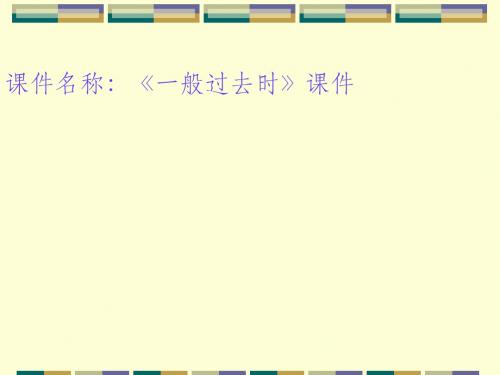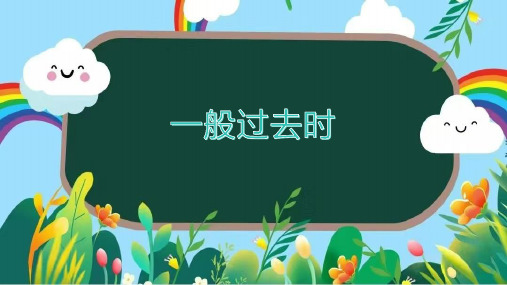一般过去时参考说课讲解
一般过去时.语法讲解PPT

一般过去时常用的时间状语包括过去的时间点、过去的时间段 等,而过去完成时常用的时间状语包括“已经”、“之前”等
。
05
一般过去时的练习与巩固
填空练习
总结词
填空练习是巩固一般过去时的有效方法,通过在句子中留空,让学生填写正确的动词时态,加深对一般过去时的 理解和运用。
详细描述
在填空练习中,教师可以选择一些包含一般过去时的句子,故意去掉动词时态部分,让学生根据上下文语境和时 态规则填写正确的时态。例如,“Yesterday, I ____(go) to the park with my family. We ____ (have) a great time.” 学生应该填写“went”和“had”。
表示过去的习惯或经常发生的动作
描述过去的习惯
一般过去时可以用来描述过去经常发 生的动作或习惯,例如“He used to smoke a pack of cigarettes a day” (他以前每天抽一包烟)。
描述过去的频率
一般过去时可以用来表示过去某个时间 段内发生的动作的频率,例如“We met every week”(我们每周见面一 次)。
一般过去时表示动作已经完成,而过去进行时则表示动作正在进行中。
总结词
时间状语不同
详细描述
一般过去时常用的时间状语包括过去的时间点、过去的时间段等,而 过去进行时常用的时间状语包括“当时”、“正在”等。
与过去完成时混淆的用法
总结词 详细描述
总结词 详细描述
动作是否完成
一般过去时表示动作已经完成,而过去完成时则表示在过去的 某个时间点之前已经完成的动作。
选择练习
总结词
选择练习是一种常见的练习方式,通过提供多个选项,让学生选择符合语境和语法规则的答案,进一 步巩固一般过去时的运用。
小学英语时态之 一般过去时讲解课件ppt

一般过去时:
定义: 一般过去时,是表示过去某一时刻或某一段时间内发生的动作或存在
的状态。
标志词: yesterday, just now, …ago, last…, this morning …
结构: 谓语是be动词
谓语是行为动词
肯定句: 主语+ was/were + 其他 否定句: 主语+ was/were + not + 其他 一般疑问句: Was/Were + 主语+其他? 肯定句: 主语+ 动词的过去式 + 其他 否定句: 主语+ didn’t +动词原形 + 其他 一般疑问句:Did + 主语+ 动词原形 +其他?
at the weekends this morning often
usually
last Mid-Autumn Festival
every day three days ago on Mondays
tomorrow a moment ago 14 years ago
找出表示一般过去时的时间副词。
( B) 1. My mother had breakfast and____to work.
A. go B. went C. going D. to go
( A)2. -- How __ your vacation?
-- It was pretty good. A. was B. were C. did D. do
( )3.Each student one picture.
A.draw B. draws C. drawing D.to drawing
八年级英语语法讲解-一般过去时精选教学PPT课件

Infinitive am is are begin break bring build buy can
不规则动词表
Past tense was were begun broke brought built bought could
Infinitive catch come do draw drink drive eat fall
或许,只有王林,只有他自己才知道,这个没有答案的答案吧。 这是耳根第一本真正意义上完结的作品,也是第一本仙侠,我总觉得,仙侠小说是没有结局的,我不喜欢写王林成为了宇宙苍穹第一人诸如此类的笑话。
我想写的是一个有血有肉的人,一个为了心中的逆,去一路逆天而走的男人。 修仙,没有尽头,所以我写了还有第四步,第五步,第六步,或许,还有更多,那是一条漫长的道路。 这正是代表了人的追求与执着,代表了一种理想的攀升与遥望,如前进的脚步,永生不会停止,会一直走下去。 仙逆,只是王林一生的一部分,是最早的一部分,在此后,他还会有更多的人生,只不过这部分人生,不是在书里体现,而是在我们的想象中畅游。
passed cooked 2、元浊 /d/ ,即 ed 在元音,浊辅音后面念 /d/ ,
例:borrowed enjoyed called moved
3、/t/ /d/ 之后念 /id/ , 即 ed 在 /t/ /d/ 音后面念 /id/ 例:wanted shouted needed counted
Past tense caught came did drew drank drove ate fell
用法 1、表示过去某个时间发生的动作或存在的状态。
He was here yesterday. I got up at six thirty yesterday morning. My father was at work yesterday afternoon. Did you have a good time last summer?
一般过去时复习课说课稿资料

一般过去时复习课说课稿语法教学(一般过去时说课稿)一、说教学内容我说课的内容是PEP教材六年级下册语法内容一般过去时.1.教材内容本节课复习的内容为Unit 2的语法:一般过去时.围绕“发生在过去的动作”这一话题,复习一般过去时的概念和结构以及动词变过去式的规则和不规则变化,尽可能多地滚动复习更多相关的动词短语。
本课要掌握的短语和句子有: watched TV; washed my clothes; cleaned the room; played football; stayed at home; read a book; read a book; saw a film; had a cold;Key sentences: What did you do last weekend? I played football; Did you read books? Yes, I did. No, I didn’t.2.教学目标依据小学英语课程的总目标,本单元知识的前后联系及对学情的分析,从3个维度出发,我把本课的教学目标定位为:(1)通过复习能够用What did…句型询问他人在过去的时间里所作的事情并作答。
如:What did you do last weekend? I played football. (2)能够用Did you…句型询问他人在过去的时间里是否作某事并作答。
如:Did you read books? Yes, I did. No, I didn’t.语法教学(一般过去时说课稿)一、说教学内容我说课的内容是PEP教材六年级下册语法内容一般过去时.1.教材内容本节课复习的内容为Unit 2的语法:一般过去时.围绕“发生在过去的动作”这一话题,复习一般过去时的概念和结构以及动词变过去式的规则和不规则变化,尽可能多地滚动复习更多相关的动词短语。
本课要掌握的短语和句子有: watched TV; washed my clothes; cleaned the room; played football; stayed at home; read a book; read a book; saw a film; had a cold;Key sentences: What did you do last weekend? I played football; Did you read books? Yes, I did. No, I didn’t.2.教学目标依据小学英语课程的总目标,本单元知识的前后联系及对学情的分析,从3个维度出发,我把本课的教学目标定位为:(1)通过复习能够用What did…句型询问他人在过去的时间里所作的事情并作答。
初中英语-一般过去时-教学省公开课获奖课件说课比赛一等奖课件

16
一般疑问句
在句首加上 Did,动词变为原形,其他不变。如: Did Li Ming bobuugyht a book on Monday.?
肯定回答: Yes,… did. 否定回答: No,… didn’t. 有be动词存在旳句子,将was / were 放在句首,其他位置不变。
如: It was hot yesterday. 变为: Was it hot yesterday?
肯定回答: Yes,… was/were. 否定回答: No,… wasn’t / weren’t.
17
特殊疑问句
疑问词+did+主语+动词原形+其他
Where did you go last weekend? What did you do there? Who did you go with? When did you get home? How did they go to the cinema?
再加 –ed,如: stop---stopped 5. 不规则动词旳过去式变化规律性不强,需多加记忆,如:
go---went, get---got, buy---bought 等
9
04
常用时间状语
10
常用时间状语
last week tomorrow yesterday often two years ago sometimes at this weekend now usually
疑问词+was/were+主语+其他 Where were you last night?
18
Summary
一般过去时公开课优秀课件pptx

课程总结
回顾本节课的重点和难点,鼓 励学生在日常生活中积极运用 一般过去时进行交流
02 一般过去时基本概念
定义及作用
定义
一般过去时表示过去某个时间里 发生的动作或状态。
作用
用于描述过去发生的事情,表达 过去的经历、状态或情感。
构成形式
01
was/were + 动词的过去分词( 用于第一、三人称单数和第二人 称)
03 一般过去时用法详解
表示过去某个时间里发生的动作或状态
动作发生在过去
用一般过去时表示在过去某个时间里 发生的动作或状态,句中常有明确的 时间状语。例如:yesterday, last week, an hour ago等。
状态在过去存在
除了表示动作外,一般过去时还可以 表示过去存在的状态。例如:I was at home yesterday.(我昨天在家。)
与过去进行时的对比
动作进行与完成
一般过去时表示过去某个时间点 完成的动作,而过去进行时强调 过去某个时间点正在进行的动作
。
动词形式
一般过去时使用动词的过去式, 而过去进行时使用“was/were
+ 现在分词”的形式。
语境差异
一般过去时适用于描述单一、完 整的动作,而过去进行时适用于 描述背景、持续的动作或同时发
达。
鼓励同学们多读书、多看电影 、多听音乐,不断拓展自己的 视野和知识面,提高自己的跨 文化交际能力。
期待在下一次的课程中与大家 再次相聚,共同探讨英语学习 的乐趣和奥秘。
THANKS
04
例句:When I was a child, I often played football in the street. ( 当我还是个孩子的时候,我经常在街上踢足球。)
一般过去时讲解课件(共19张PPT).ppt

否定句
1) 主语+wasn’t/weren’t+表语
He wasn’t a student ten years ago.
2) 主语+didn’t+动词原形+其他
They didn’t have a good time last night.
4.一般过去时的结构
一般疑问句
was为单数; were为复数
一般过去时的结构
4.一般过去时的结构
was为单数; were为复数
肯定句
1) 主语+was/were+表语
He was a student ten years ago.
2) 主语+动词过去式+其他
They had a good time last night.
4.一般过去时的结构
was为单数; were为复数
时间+ago类 in+年份类
yesterday morning;yesterday.... last night; last week...
two days ago in 2023
动词过去式的变化
3.动词过去式的变化 1.直接加ed work--worked look--looked 2.不发音的e结尾,去e加ed hope--hoped like--liked 3.重读的闭音节词,双协结尾字母加ed stop--stopped plan--planned 4.以辅音字母加y结尾,变y为i再加ed study--studied try--tried 5.不规则变化
What did they do last night?
总结与练习
5.总结与练习
一般过去时 1.定义:表示一个过去发生的动作或表示过去存在的状 态 2.标志词:yesterday,last...,....ago, just now..... 3.动词的过去式变化 4.一般过去时的各种句型:
一般过去时说课ppt课件

No,we/you were not. No,we were not. No,they were not.
Did I work? Yes,you did. No,you did not. work Did we work? Yes,we/you did. No,we/you did not.
Did you work? Yes,I did. No, I did not.
4. ______ you _______ (visit) your relatives last Spring Festival?
5. ______ he _______ (fly) a kite on Sunday? Yes, he ______.
6. Gao Shan _______ (pull) up carrots last National Day holiday.
9
Step 2. General introduction
• 定义:一般过去时态表示过去某个时间发生的动作或存
定义 在的状态,常和表示过去的时间状语连用。
• 过去时间里发生的动作或状态。
用法 • 过去经常或反复发生的动作。
• 规则动词后加 –ed 或 -d。
构成 • 不规则动词过去式需注逐一熟记。
难点 • 学生灵活运用所学知识 准确流畅的与他人交流 6
教法与学法
教法
任务教 学法
交际教 学法
学法
参与 探究 交流 合作
7
Stage 5 教学设计及过程 1.Lead-in(3’)
2.Introduction of the tense(3’) 3.The changes of verbs(14’) 4.Different sentence structures(4’) 5. Time for students to practice(14’)
- 1、下载文档前请自行甄别文档内容的完整性,平台不提供额外的编辑、内容补充、找答案等附加服务。
- 2、"仅部分预览"的文档,不可在线预览部分如存在完整性等问题,可反馈申请退款(可完整预览的文档不适用该条件!)。
- 3、如文档侵犯您的权益,请联系客服反馈,我们会尽快为您处理(人工客服工作时间:9:00-18:30)。
(一)考参时去过般精品文档语法:动词的一般过去时教学目标:1.能掌握动词过去式的变化规则和一般过去时的用法2.能灵活运用一般过去时进行肯定句、否定句、一般疑问句和特殊疑问句的句式转换。
教学重点: 一般过去时的句式结构及运用教学难点: 灵活运用一般过去时进行句式转换教学过程:课前延伸(1、)语法导入:|I am a student.(我是个学生。
)【一般现在时】I was a student.(我曾经是个学生。
)【一般过去时】找出上面的不同之处吗?(2)学生自主学习:初步理解一般过去的用法,并能把握和运用be动词的一般过去时的句式结构用法:一般过去时态表示过去某个时间发生的动作或存在的状态,也表示过去经常或反复发生的动作,常和表示过去的时间状语连用,如:once upon a time从前收集于网络,如有侵权请联系管理员删除.精品文档just now刚才a moment ago刚才yesterday昨天Yesterday morning昨天上午the day before yesterday前天in the past在过去last year去年last month上个月a week ago一周前two years ago两年前in 1990在1990年in 2003收集于网络,如有侵权请联系管理员删除.精品文档在2003年提示:一般过去时态中相应的谓语动词要变成动词过去式,如is/am →was, are →were, do→did, have/has→had ,want→wanted ,see→saw 等含有be动词的一般过去时的基本句式:1.肯定句:主语+ was/ were + 其他.e.g. 1)I was born in 1994.2)There were many trees in our country ten years ago.2.否定句:主语+ was not( wasn't)/ were not (weren't) + 其他e.g. 1) He wasn't well-behaved at primary school.2) We weren't here yesterday.3.一般疑问句:Was/ Were + 主语+其他?Yes, …was/were./No, …wasn't/weren'te.g. 1)Was Miss Zhao your first teacher?=>Yes, she was. / No, she wasn't.2) Were they busy making the project last week? =>Yes, they were./ No, they weren't.4.特殊疑问句:特殊疑问词+ was/ were +主语+ 其他?e.g.1)What was your first friend like?你的第一位朋友是怎样的?=> He was very friendly and well-behaved.2) when were you born?你什么时候出生的?=> I was born in 1990.测试学生学习掌握的was /were 的情况.1. There ____ a big garden with lots of trees in it last year.收集于网络,如有侵权请联系管理员删除.精品文档A. isB. wereC. wasD will be2. They _______ born in Quincy, but in New York.A. wasB. wereC. wasn'tD. weren't3. Was it a big town?--- ___. It was a small village.A. Yes, it is.B. No, it isn'tC. Yes, it was.D. No, it wasn't.4. --- ____________ ?--- Ms Zhang.A. Who was your first teacher?B. What was the name of the town in the past?C. Was it a city in the past?D. What was your first teacher like?Exercise 2 用be动词的适当形式填空. 1.Adam and Tony _______ born in 1990.2. My first friend ________ Jenny. She was Anny.3 . _____ Tony at home yesterday?4--- Where _____ you born?---- I born in Cambridge.课中探究Step 1) 导入新课:通过课前延伸进行练习检测收集于网络,如有侵权请联系管理员删除.精品文档Step 2)讲授新知并及时检测:A 教授动词的过去式变化:能掌握1.规则变化和2.不规则变化:Exercise:写出下列规则变化动词的过去式1、pick _____ look _______fold ______ fill ______2.like ______ smile _______notice_______ move _______3.stop _______ fit ________drop_______ cup______4.worry _______ cry _____hurry _____ try ________B、教授行为动词(即实义动词)的过去式的句式结构和变化:要求学生掌握行为动词(即实意动词)的过去式的基本句型: 肯定句、否定句、一般疑问句和特殊疑问句的句式结构和句式变化。
Exercise:句式转换:Betty 昨天下午在图书馆见到了Daming。
Betty _____(see) Daming in the Library yesterday afternoon.(肯定句)变为否定句:Betty ______ ______ Daming in the library yesterday afternoon.变为一般疑问句:______ Betty ______ Daming in the library yesterday afternoon?收集于网络,如有侵权请联系管理员删除.精品文档肯定回答:- Yes, she ______ .否定回答:-No, she ______.变为特殊疑问句:(1)对in the Library 提问(即对地点提问):______ ______Betty______ Daming yesterday afternoon?(2)对yesterday afternoon 提问(即对时间提问):______ ____ Betty _____ Daming in the library?Step 3.Test 学以致用,看看经过接近一节课的努力,成果如何!Exercise1 : 选择正确的答案。
1. Once upon a time a big tiger _______ in the forest.A. liveB. livesC. livedD. is living2. She walked in the park and _______ some flowers.A. pickB. picksC. pickingD. picked3. The boy didn't ______his mother in the crowd.A. findB. foundC. findsD. finded4. Did Betty _______ Quincy in 2003?Yes, she ____.A. left, didB. leaves, didC. left , didn'tD. leave, did5. -- _____ did he go to school? --- He rode a bike to school.A. WhenB. whyC. HowD. WhereExercise 2: 用所给动词的正确形式填空:收集于网络,如有侵权请联系管理员删除.精品文档1. My daughter ______ ( do ) her homework last night.2. I _______ (take) the train to Beijing two days ago.3. We ______ ( hide ) our teacher in the classroom yesterday.4. We _______ ( see ) many birds an hour ago.5. They _______ ( move) to Beijing in 2005.Exercise 3:句式变换1.He didn't have a good time yesterday.(变为肯定句)He______ a good time yesterday.2. Tony walked to school last week. (变为一般疑问句)______ Tony______ to school last week?3.They watched TV last night. (对划线部分提问)______ _______they TV?Step 4) 课堂小结(Summary)Step 5) Homework: (必做题和选做题)必做题:1、找出Module 9—10中的动词过去式,越多越好,多多益善哦,相信你尽心尽力一定能找出很多!2、整理笔记,把握住学习的重点一般过去时,并能灵活运用所学句式进行变换选做题收集于网络,如有侵权请联系管理员删除.精品文档3: 完成短文Yesterday I ______(go) to bed at 10.p.m.I _______(wake) up at 2 a.m. and________(smell) something burning. I _______ (jump) out of bed .And _____ (run) to the kitchen. I ______ (see) nothing there: it was dark and quiet. I _________ (run) to the livingroom. The television ______ ( be) still on. I ______(forget) to turn it off before I________ (go) to bed last night.课外拓展不规则变化的动词过去式很多,一一记住它们难度很大,那我们是否一起来开动脑筋,看看不规则变化的动词里面是否也偷偷隐藏着一些规律呢?一起来看老师给同学们找到的一些规律吧,相信它们会帮助你们更容易的记忆!1) 过去式为动词原形:cut—cutlet —letput—putread —readhurt—hurt2) 过去式仅改变词中间的字母:get—gotsit—satmake—mademeet—metstand —stoodcome—camedrive—drove3)过去式仅改变词末的字母:send—sentspend—spent收集于网络,如有侵权请联系管理员删除.精品文档fly—flewbuild —builtsay—saidsmell—smeltlend —lentlose —lost4)过去时改变了大部分字母:go—wentwear —worecan—couldbring —broughtbuy —boughtthink —thoughtcatch—caughtteach —taught再延伸归纳的特点O →a : come –camebecome –becameO→e: blow –blew hold –heldknow- knewthrow - threw以t结尾:1)build –builtsend –sent收集于网络,如有侵权请联系管理员删除.精品文档spend–spentsmell–smeltlose –lost2)burn –burntlearn –learntmean –meant3)sweep –sweptfeel –feltsleep- sleptkeep- kept收集于网络,如有侵权请联系管理员删除.。
